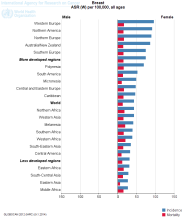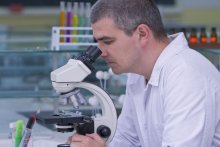
The coming year will be a challenging one for breast cancer physicians and researchers as new figures show that the number of breast cancer cases worldwide is on the rise.
The World Health Organisation’s International Agency for Research on Cancer (IARC) recently released the latest global statistics on cancer incidence, mortality and prevalence.

Breast cancer survivors taking aromatase inhibitors (AIs) such as anastrozole, letrozole, and exemestane experienced a reduction in joint pain if they exercise while on treatment, according to results presented at the 2013 San Antonio Breast Cancer Symposium, which is currently underway.

When a woman is diagnosed with breast cancer it is not only she who embarks on an unexpected and unwelcome journey – her partner will also inevitably experience their own challenging cancer journey.

It has been very exciting to track down Dr Elizabeth Iorns – a scientist who is conducting ground-breaking experiments in America to reduce the genetic transmission of BRCA – and realise that she grew up in New Zealand!

New research shows that a lack of clinical trials aimed specifically at younger breast cancer patients leaves knowledge gaps that could be partly to blame for their poorer survival rates.
The study, by Cancer Research UK study published in the Journal of the National Cancer Institute, analysed almost 3000 British women diagnosed with breast cancer under the age of 40.

A Missouri University of Science and Technology researcher has developed a new screening method that uses urinalysis to diagnose breast cancer – and determine its severity – before it could be detected with a mammogram.

UK scientists have discovered a number of genes which are responsible for developing resistance to a targeted medicine used in the treatment of HER2-Positive breast cancer.
The team at the Institute of Cancer Research in London examined a number of genes that were overactive in women with HER2 Positive breast cancer who had developed a resistance to the drug Lapatinib (Tykerb).

A new study shows that there’s been a small, but significant increase in the incidence of advanced breast cancer in young American women aged 25 to 39, without a corresponding increase in older women.

A recent study has found a further link between low vitamin D levels and premenopausal breast cancer.

New research results show that women with oestrogen receptor positive breast cancer who take the drug tamoxifen for ten years rather than five, have a reduced risk of breast cancer recurring and better overall survival rates.
The findings of the ATLAS (Adjuvant Tamoxifen – Longer Against Shorter) study were presented this week at the renowned San Antonio Breast Cancer Symposium.



